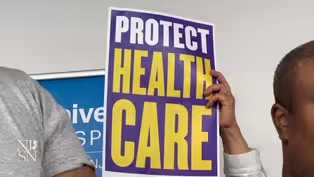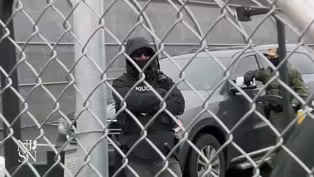NJ Spotlight News
How ICE's crackdown impacts mental health
Clip: 7/11/2025 | 5m 3sVideo has Closed Captions
Interview: Anxiety, stress, PTSD and the role intergenerational trauma plays
Ramped-up ICE raids are taking a mental health toll on immigrant communities and families. Advocates tell NJ Spotlight News that the chronic uncertainty over fear of deportation is being linked to heightened anxiety and post-traumatic stress, particularly for children in mixed-status homes.
Problems playing video? | Closed Captioning Feedback
Problems playing video? | Closed Captioning Feedback
NJ Spotlight News is a local public television program presented by THIRTEEN PBS
NJ Spotlight News
How ICE's crackdown impacts mental health
Clip: 7/11/2025 | 5m 3sVideo has Closed Captions
Ramped-up ICE raids are taking a mental health toll on immigrant communities and families. Advocates tell NJ Spotlight News that the chronic uncertainty over fear of deportation is being linked to heightened anxiety and post-traumatic stress, particularly for children in mixed-status homes.
Problems playing video? | Closed Captioning Feedback
How to Watch NJ Spotlight News
NJ Spotlight News is available to stream on pbs.org and the free PBS App, available on iPhone, Apple TV, Android TV, Android smartphones, Amazon Fire TV, Amazon Fire Tablet, Roku, Samsung Smart TV, and Vizio.
Providing Support for PBS.org
Learn Moreabout PBS online sponsorshipYeah, and ramped up ICE raids aren't just having an impact on businesses, but also on the mental health of immigrant communities and their families.
Advocates tell NJ Spotlight News the chronic uncertainty over fear of deportation is being linked to heightened anxiety and post-traumatic stress, especially for kids in mixed status homes, who say they worry a parent or loved one could be detained at any time, leaving them to pick up the pieces.
I spoke with our mental health writer Bobby Brier on Tuesday just before the incident in Edison about the issue and one Redbank family he followed dealing with the aftermath of deportation.
Bobby, good to see you.
You spoke with not just mental health professionals, but also people who have been impacted directly by this about the long-term effects, and I wonder what stood out to you the most about how this trauma lingers long after a family member or a loved one has been deported.
That's right.
You know, multiple uh mental health therapists that I spoke to really spoke to this term that they coined intergenerational trauma.
What is that?
Um intergenerational trauma is essentially untreated trauma uh from things like separations, deportations uh or fear that really uh kind of ripples down through a family.
So say a grandparent uh maybe face deportation.
Um if that trauma is not addressed that often time uh is passed down uh to the parent which is then passed down to the child.
Um, a lot of times this may come out in things like uh emotions or behaviors or mental health therapists have even said silence, just not even talking about the issue at all.
Until that is really addressed, uh, that intergenerational trauma is addressed, that's really when the healing process can start for a lot of uh, families and children that are experiencing a lot of raids, deportations, or arrests right now or even the threat of them.
Uh, they're really looking at uh, issues of intergenerational trauma that will long uh, last long after this current administration.
Yeah.
I mean, when you think about immigration and this sort of hardline policy from a 30,000 foot level, you might not necessarily connect the mental health component, but you found some really powerful stories.
That's right.
You know, I spoke to a young advocate uh with the uh American Friends Service Committee and she is now 21 years old.
Her father uh was deported when she was just 14 years old.
uh what she really told me in recent interviews was that these recent events that she's witnessing are really unfortunately uh kind of her reliving some of the trauma that she's lived through uh in the past.
One of the things that she did speak about though were some of the efforts that she is taking along with community organizations to really uh address some uh immigration rights uh and to allow people uh that they that they have rights that they have legal representation that's available to them and the importance of staying in community as much as possible uh and to not isolate socially.
Oftentimes those are two keys uh in order to improve mental health long term.
I want to get to those resources in a bit, but I just want to stay on this uh for a moment.
How does that story, this young woman in particular who you interviewed, Julie Flores Castillo, how does her story mirror what families are going through right now currently with these ramped up ICE uh raids?
Absolutely.
you know, her story is unique in its own sense, but very uh universal in the same sense really because uh as Julie had spoken about, she uh comes from a mixed status family, meaning that um the immigration status of maybe herself or her parents are different from one another.
Um what that creates for many families is this ongoing fear uh or uncertainty, a lingering uncertainty that could really cause long-term anxiety and potentially depression, wondering whether something could happen to a loved one or a family member or friend.
even though her story occurred in 2018, this is really what we're seeing playing out across the state and across the country right now for many uh mixed status families and loved ones.
Okay.
So, do these communities have enough and the right mental health resources to turn to especially for the kids.
You know, right now there are certainly resources available.
There's places like the American Friends Service Committee uh that has the uh immigrant rights program here in Newark.
There's also places like Make the Road New Jersey um along with many other organizations and folks working on the ground to really address the mental health impact.
But what many advocates and and mental health professionals have talked about is this true lack of bilingual therapists, therapists who could speak both Spanish and English and have a level of cultural competency that could really address the underlying mental health issues that so many people are facing right now.
Uh that that lack of bilingual therapists is not just here in New Jersey, but it is nationwide.
So, that's really a push that we're seeing from mental health professionals to be able to uh gain more bilingual therapists uh in in order to address some of this this ongoing trauma.
All right, you can read uh Bobby Brier's reporting on this and uh more on our website, njspotlightenews.org.
Bobby, great reporting.
Thanks so much for coming in.
Thank you, Brianna.
Democrats gear up for big congressional challenge
Video has Closed Captions
Clip: 7/9/2025 | 4m 59s | Republican Rep. Tom Kean Jr. of 7th District has held the seat for two terms (4m 59s)
Edison ICE raid leaves workers, families on edge
Video has Closed Captions
Clip: 7/9/2025 | 4m 47s | Families of detainees are seeking legal help (4m 47s)
Harmful algal blooms grow in NJ lakes, reservoirs
Video has Closed Captions
Clip: 7/9/2025 | 4m 55s | Cyanobacteria led state Park Service to ‘retire’ swimming at Spruce Run Recreation Area (4m 55s)
Providing Support for PBS.org
Learn Moreabout PBS online sponsorship
- News and Public Affairs

Top journalists deliver compelling original analysis of the hour's headlines.

- News and Public Affairs

FRONTLINE is investigative journalism that questions, explains and changes our world.












Support for PBS provided by:
NJ Spotlight News is a local public television program presented by THIRTEEN PBS


